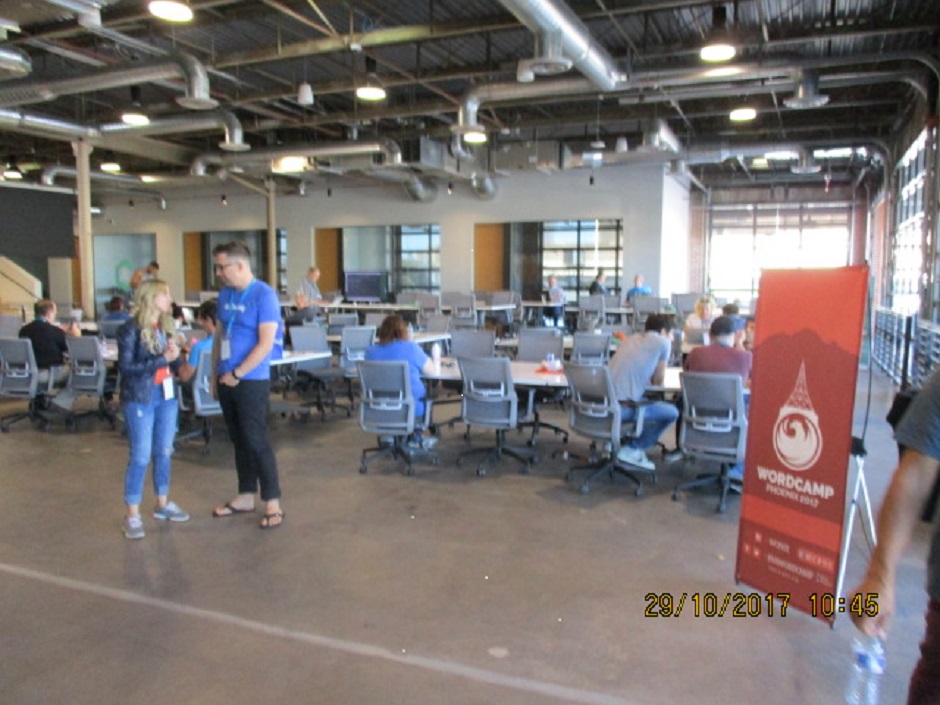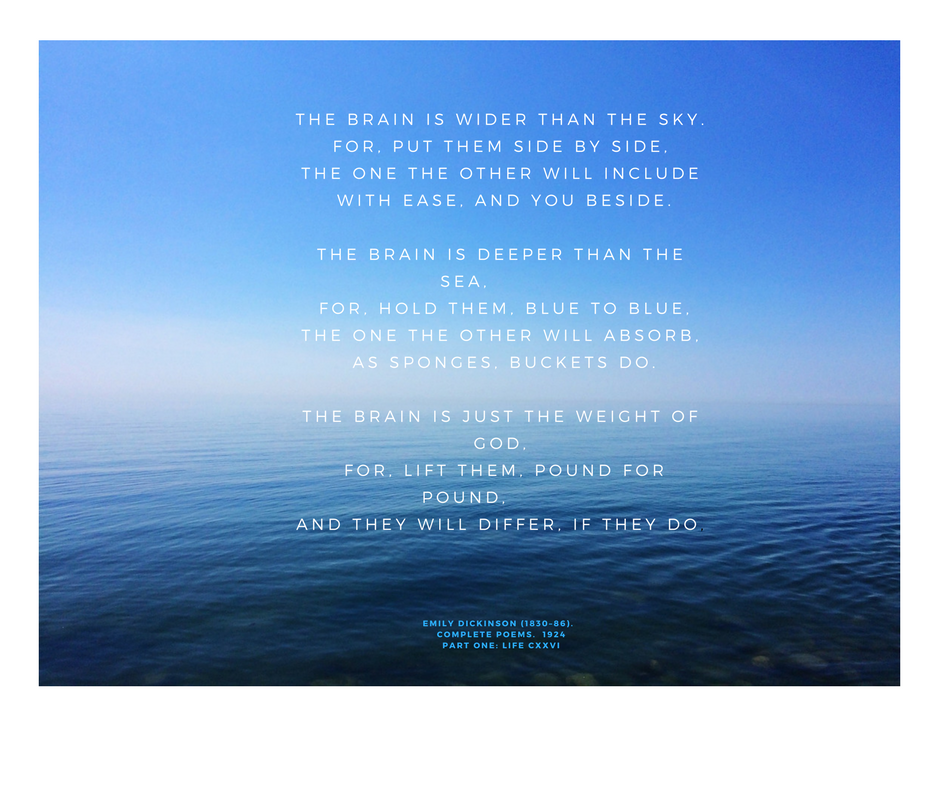
Brain poetry is a thing. How could I not know this? It takes the 2017 WordCamp conference in Phoenix to discover this.
For those of you not in the know, WordCamps are regional meetings for developers, designers, and users of the WordPress platform for Internet delivery of content. This blog is courtesy of WordPress which is an open-source community supported vehicle. I wouldn’t be here if I had to translate code into content for which I am eternally grateful to WordPress.
You probably know from your own experience that you skip certain presentations at conferences that don’t interest you. And, usually, the early scheduled programs on Day 1 have key information. My schedule reads Day 1, 9:45 am – Poetry is the One Simple Hack, Shawn Pfunder. There’s no follow up descriptive.
Since I’m not a fan of poetry and checking to make sure I’m really at a tech conference, I’m tempted to find a coffee source. Too late – the speaker’s been introduced and exiting from the middle of the second row will be embarrassing.
Now, I should know that there’s a good reason for scheduling this, but I’m into my anti-poetry mood. That is until Pfunder says the magic word “brain.” Okay, … you’ve got my full attention now.
He references a study by University of Exeter Medical School. In essence, the study used magnetic resonance imaging (fMRI) to track which parts of the brain responded when different types of literature were read. Both prose and poetry activate the normal “reading network.”
However, when content contains emotional elements, the brain is activated as if listening to music with its own autobiographical memories and associations. Thus with prose and poetry, “… the emotional response to literature shares ground with the response to music, and regions of the right hemisphere are engaged by poetry.”
Poetry, not only touches our emotional circuits in its evocative memories and lyrical resonance but also, moves our brain into introspection – a resting state of “… the posterior cingulate cortex and medial temporal lobes.”
Nice to know poetry affects the brain this way, but why should we be reading poetry when we anchor ourselves to our computers?
Or even, who has time to read poetry unless you’re already a poetry aficionado?
For us, minimal or non-poetry readers, Pfunder explains how poetry opens the brain to being brain poetry. It gives your brain default to structure and function something new and vital.
It’s …
- space that opens up new ideas
- patience that lets ideas come to you
- inspiration which leads to new connections
- unpredictable images and ideas that pull together
- relationship changes to how you work and problem solve
- entrée to a higher level of innovating thinking and creativity
I leave you with a little brain poetry to contemplate.

Resources:
http://www.ingentaconnect.com/contentone/imp/jcs/2013/00000020/F0020009/art00008
https://mic.com/articles/103490/why-we-should-all-be-reading-more-poetry#.GlLsyNm2j
http://nymag.com/scienceofus/2017/05/this-is-what-happens-to-your-brain-when-you-read-poetry.html
http://www.bartleby.com/113/1126.html
Image: Joyce Hansen WordCamp 2017 Phoenix, AZ @ Galvanize; Pixabay 828908
You Can Find Me At -


This reminds me of my days back in high school. I use to love poetry but it’s a long while since I settled down to enjoy a good one
I guess poetry has a way of creeping back into our lives. We never really give it up.
Joyce,
I always enjoy how you take a complex topic and make it simple and fun. Your experience highlights how much we can learn when we are open and willing to give ourselves space to absorb new areas in life.
Thank you for sharing.
Why thank you Yvonne. It’s much appreciated to know that you enjoy what I write.
I love reading poetry, Joyce, and now I understand why. So interesting to know the brain responds the same way to poetry as it does to music. It also explains why so much emphasis is put on adding emotional words to headings for blogs. Isn’t it wonderful how much we can learn when we participate in something we would usually avoid?
Yes, I’m all for being open to whatever the Universe is sending me. And, the message this time is poetry. It should be interesting as to where this leads.
I used to love poetry. Who would’ve ever expected to leave an event like that with this type of outcome? Sounds like you’re open to more of it. Thanks for sharing.
Yes, if you are open, life presents you will all kinds of new adventures and opportunities.
This is really cool stuff, Joyce. I had to laugh as you discussed your thoughts about leaping for coffee before the poetry session started. I feel the same way – not about coffee but poetry. I’m not a big poetry fan. Like, who has time to just ready poetry!?! Anyhow, I forced myself to read the brain poem you included and this information really is fascinating. Had I known you were in Phoenix, we could have gotten together! Next time.
Tandy, I plan to be back in Phoenix for the 2018 WordCamp February 17-18th or it’s 16-17th. Will make a point to connect then
I too am a reluctant lover of poetry. Much of it is wildly inaccessible to me. But! Mary Oliver (Fall Song especially moving this time of year). But! David Whyte (The Well of Grief).
There’s magic for me, when the poet’s words transcend the form enough to land right in my heart.
What a lovely experience at WordCamp! I’ve been to a couple and next time will seek out the less tech-y sessions for sure.
Well, you’re ahead of me in the poetry field. I have yet to discover Mary Oliver and David Whyte. I’ll be adding that to my poetry list because of you.
I would not have aligned poetry with music in the way it evokes emotion and images, but after reading this blog I can clearly see it.
It has been many years since I attempted to write poetry. It sounds like I should begin anew to allow new ideas and inspiration to flow
It seems to be the key that opens up new avenues of creativity. To me it seems a daunting task, but I’m willing to give it a try.
I used to write poetry regularly. Now I only do it when I cannot express very deep emotions. Maybe I should use poetry to diffuse tech woes.
Are you going to poetically write about tech woes or to escape tech woes? If it’s about tech woes, I think there’s a lot to be poetically said there. It probably will keep your brain from exploding by channeling your inner poetness.
Thanks Joyce. Who knew writing poetry is actually good for me. For those of you who want to read poetry, here is a few poetry sites who give challenges or prompts that people respond to with links back to the poetry they’ve written. Some of them, the links are in the comments. Some of them, you click MrLinkys to see the link list. Hope you find something you enjoy
DVerse Pub
Mindlover’s Misery
Imaginary Garden with Real Toads
Carpe Diem Haiku Kai
Note: Darn I can’t put up 4 links as it is registering as spam when I hit “post comment”. So I will just give the titles of the sites so you can google them to get there. Sorry.
That great Mary! I needed some direction as to where I could start my poetry journey. Thanks so much.
One of my current focuses in the BRAIN. Unfortunately, this focus has come about from my mother getting diagnosed with Alzheimers. I know now much of it is treatable and there are many ways to keep brain strong and healthy – apparently poetry is one of them! Excellent!
Yes, all kinds of neural engagements are helpful to the brain – especially classical music, there are sound tones that help the neurons to vibrate.
Thank you for this, Joyce. Fascinating. I am also somewhat poetry-shy so this was an interesting take on it!
It seems most of us are not too poetry savvy. I’m willing to revisit poetry and see what it does to my brain.
Oh, we attended WordCamp in September, held in Sacramento at the Sacramento Convention Center. I loved poetry up until my college days; however, no longer. May reconsider now that I know how it relates to the brain.
Since this was my first WordCamp, I didn’t have anything to compare it to. I came away with a lot of information besides the poetry surprise. So, I’m anxious as to what I’m going to learn at the next one.
I think that it’s a great idea to hold regional WordCamps as it adds another layer of close community.
Hi Joyce, I never heard of this either. How interesting. I am also not a big fan of poetry but I never really asked myself why. Maybe if if presented the way you introduced it in you you article, people would pay better attention to it. Thank you for sharing your new found knowledge about brain poetry and giving us a new perspective on this art form.
I certainly didn’t have a clue about this brain relationship. But, I’m all for anything that keeps the brain cells in better condition.
Love it and yes I think poetry both opens up the brain and is so creative. Something I could do more of 🙂
All it takes is a few stolen moments to read a poem. We can both start with a book of short poems.
This is so amazing. Studies show the value of music, nature and now poetry to engage and increase our minds. I appreciate your researching this for us and am sharing with my creative friends (the choir) and those who need to “step away from the computer.” Love it!
Yes, we all need to step away from the computer. But, then again, I find myself searching for poetry on the computer. Ouch!
Fascinating, Joyce! It’s interesting that you landed in that session and were pleasantly surprised by the content and how it pertains to your interest in the brain.
I am not a poetry person either, although I have tried to warm to it and have friends who are reknowned poets. Having spent some of my writing years as a song-writer, I was good at writing rhyming song lyrics, but I am not sure they count as the kind of brain poetry you learned about at the conference…or maybe they are. The benefits are really impressive and I would welcome more of all of them. Perhaps I will ‘try’ again to include more poetry in my reading and take out my friend’s poetry book tonight and indulge myself.
I think Shawn would be surprised to learn how far his “poetry hack” has gone beyond the Phoenix WordCamp. I’m with you Beverley, I’m giving poetry another chance.
What a beautiful idea. It’s certainly true that reading material that engages one emotionally is also more memorable. I’m so glad you got to learn about this at WordCamp. It’s always such a great event to attend. I wish I could go to more of them.
Since this was my first Wordcamp, I didn’t know what to expect. I found our later that Shawn is a communications director at GoDaddy, so it makes the experience even more interesting.